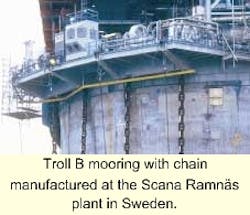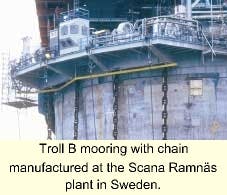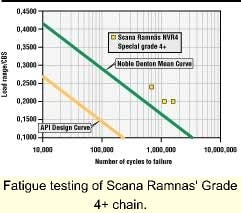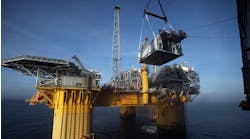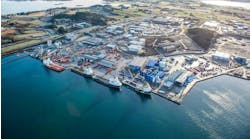SWEDEN Mooring Systems: Higher strength chain benefits deepwater rig upgrades
Troll B mooring with chain manufactured at the Scana Ramnäs plant in Sweden.
The benefits of the new high performance Grade 4+ mooring chain manufactured by Scana Ramnäs Sweden led to an order of 2,000 tons of this grade from Statoil last year. That was in a year in when most equipment manufacturers were suffering from an acute drop in business due to a marked reduction in rig repair and upgrading projects.
Scana Ramnäs claims that Grade4+ offers numerous benefits to rig oper-ators. These include 22% greater strength than other chain of the same link size. This makes it possible to upgrade the strength of a rig's moorings without encountering the requirement to fit new and larger mooring winches and fairleads, or for that matter adding further winches or thrusters.
The 2,000 tons of chain that Scana Ramnäs supplied to Statoil was used to replace corroded chain on the Veslefrikk semisubmersible platform. Although the contract did not indicate a genuine upturn in market demand, Johan Broback, Marketing Manager for Scana Ramnäs, is confident that a resurgence is imminent. "Over the past year, many rig operators seem to have been watching and waiting before they commit themselves to any upgrading work," he said. "I think the time is fast approaching when the market will force them to act and business will return to normal for the yards and the suppliers."
When that happens, Scana Ramnäs' expects that its Grade 4+ chain will form an important part of any calculations on the economics of upgrading a rig for deep water operation as the need for stronger chain will be an important cost element.
Grade 5 development
Fatigue testing of Scana Ramnas' Grade 4+ chain.
Scana Ramnäs now has plans to develop a Grade 5 chain which will offer even better performance. An agreement has been reached with ABS and DNV that work should commence, but the new chain is unlikely to be on the market before 2002. This is principally due to the requirement for it to be subjected to seawater tests and the time needed for this procedure will have a major impact upon the Grade 5 chain's arrival.
The Grade 4+ chain was actually introduced two years ago, but because the introduction of a different type of chain is so rare in the industry, it is still considered to be "new." It was used for the first time on the semisubmersible Borgland Dolphin, which was able to benefit from the mooring upgrade with the minimum of modification to its winches and fairleads.
Due to careful design and advanced metallurgy, the Grade 4+ chain has the same five-link measurement and width as the company's Grade 4 chain, yet has a break load of 7,350 kN compared with 6,010 kN for Grade 4. Being thicker, the Grade 4+ links require an additional cubic meter of chain box space for each 100 meters of chain. For most rigs, this is not a problem and with those for which it is, modifications to box space may still prove to be cheaper than fitting four or more new winches with their associated fairleads so that they can accommodate larger diameter chains.
Extensive fatigue testing has also been performed on Grade 4+ and has shown values that have superceded expectations of metallurgists at Scana Ramnas. The company has also developed a semi-automatic magnetic particle inspection system where only the visual inspection needs to be undertaken by the human eye, whereas the heavy work with - among other things - the heavy magnetizing yoke is done automatically.
Production capability
Scana Ramnas' factory in Ramnas, Sweden has two fully automated production lines capable of manufacturing 16,000 tons of 70-165 mm diameter chain annually. A second factory in Ljusne has one production line with the capacity to make 10,000 tons of 70-102 mm chain.
Under the automation process, steel bars alloyed with chrome are heated, bent, welded and inspected continuously. The chain links are heat treated to achieve the required mechanical properties and each chain link is then tested to 70% of the Mean Break Load level.
For more information, contact; Johan Broback, Scana Ramnäs: tel +46 220 22000, fax: +46 220 35837, E-mail: [email protected]
